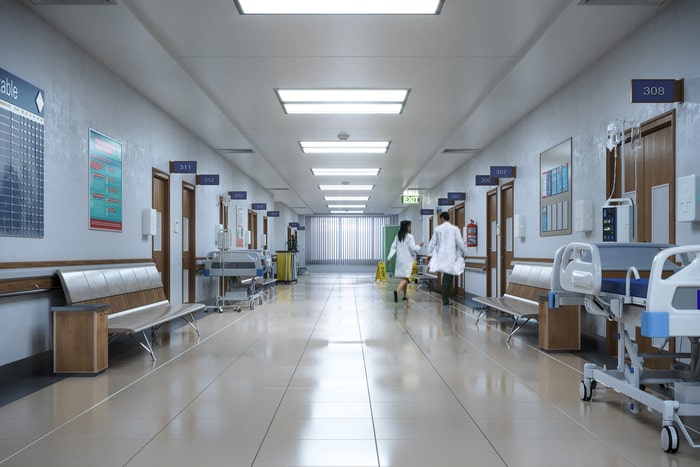
- August 11, 2023
- |security guard company
- | 0
- 2,581
Ensuring Hospital Safety –
In the realm of healthcare, patient safety and privacy are paramount. As a distinguished hospital security company, XPressGuards recognizes the critical importance of securing restricted areas within medical facilities. This article delves into the significance of restricted areas, the reasons behind their implementation, and the advanced security measures that hospitals employ to safeguard patient well-being, sensitive information, and specialized equipment.
1. The Significance of Restricted Areas
Restricted areas within hospitals are designated spaces where access is limited to authorized personnel only. These areas serve diverse purposes, including safeguarding patient privacy, protecting valuable medical equipment, preventing unauthorized access to critical supplies, and ensuring the security of sensitive data.
2. Types of Restricted Areas in Hospitals
Patient Care Areas: These include patient rooms, operating theaters, intensive care units (ICUs), and labor and delivery suites. Restricted access ensures that patients receive focused and undisturbed care while maintaining their privacy and dignity.
Laboratories and Research Facilities: Laboratories and research areas house valuable equipment, experimental materials, and sensitive data. Restricted access prevents contamination, theft, and unauthorized handling of critical resources.
Pharmacies: Pharmacies contain controlled substances, medications, and patient prescriptions. Restricted entry prevents theft, safeguards medications, and ensures compliance with regulations.
Radiology and Imaging Suites: These areas house sensitive imaging equipment and patient records. Restricted access prevents tampering, ensures patient confidentiality, and maintains the integrity of diagnostic processes.
Equipment Storage Rooms: Hospitals store specialized medical equipment in restricted areas to prevent damage and theft. Restricting access also ensures that equipment remains clean and functional for patient care.
Sensitive Data Centers: Hospitals store electronic health records (EHRs), billing information, and other patient-related data in secure servers. Restricted access safeguards patient privacy and prevents data breaches.
3. Securing Restricted Areas
Access Control Systems: Hospitals utilize access control systems that incorporate keycards, biometric identification, and secure codes. Only authorized personnel are granted access, and their movements are tracked and logged for accountability.
Video Surveillance: Advanced video surveillance systems monitor restricted areas. Surveillance footage aids in investigating any breaches or incidents and acts as a deterrent to potential unauthorized personnel.
Security Personnel: Trained security personnel are stationed at entrances to restricted areas. Their presence deters unauthorized access and ensures that only authorized individuals enter.
Badge Identification: Authorized personnel wear identification badges that display their roles and clearance levels. This visual cue enables easy identification and alerts staff to any unauthorized individuals.
Visitor Management: Hospitals implement visitor management protocols to control access to restricted areas. Visitors must be accompanied by authorized personnel and adhere to visitor guidelines.
Emergency Lockdown Protocols: Hospitals have protocols for swiftly locking down restricted areas in case of emergencies. These protocols ensure that sensitive areas remain secure during crisis situations.
Security Alarms: Alarm systems are integrated into restricted areas. Any unauthorized entry triggers alarms, alerting security personnel to respond promptly.
4. Staff Training
Hospital staff undergo comprehensive training on the importance of restricted area security. They are educated about access protocols, the significance of maintaining patient privacy, and the potential consequences of breaches.
5. Audits and Assessments
Regular security audits and assessments are conducted to evaluate the effectiveness of security measures. Independent experts review access control systems, surveillance footage, and overall protocols to identify vulnerabilities and suggest improvements.
6. Compliance with Regulations
Hospitals adhere to various regulatory standards such as the Health Insurance Portability and Accountability Act (HIPAA) and the Health Information Technology for Economic and Clinical Health (HITECH) Act. These regulations mandate strict security measures to protect patient information and privacy.
7. Continuous Improvement
Hospitals are committed to continuous improvement in restricted area security. Regular evaluations, staff feedback, and advancements in security technology ensure that measures remain up to date and effective.
Securing restricted areas within hospitals is a foundational element of healthcare safety and patient well-being. By implementing robust access control systems, surveillance technology, and staff training, hospitals create an environment where patients receive quality care, sensitive data remains confidential, and valuable resources are protected.
As a respected hospital security company, XPressGuards collaborates with healthcare facilities to ensure that restricted areas are effectively secured, contributing to a secure and trusted environment for patients, staff, and sensitive medical processes. Contact us to learn more about our services.


